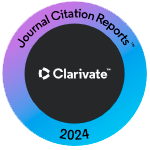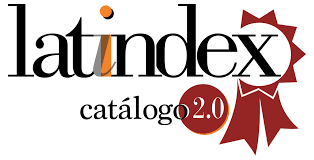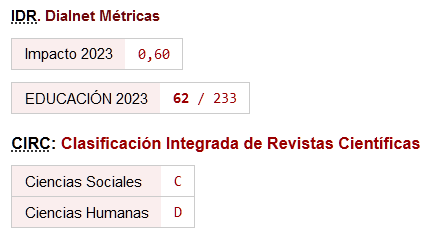La competencia digital de los estudiantes universitarios latinoamericanos
DOI:
https://doi.org/10.46661/ijeri.4387Palabras clave:
Competencia digital, Educación Superior, alfabetización tecnológica, género, edadResumen
La investigación que se presenta es un primer acercamiento al estudio del nivel de competencia digital autopercibida de los estudiantes universitarios en el contexto latinoamericano con una muestra representativa de 5 países de la región. Para la recogida de datos se ha utilizado el instrumento INCOTIC adaptado para el contexto Latinoamericano.
Las variables objeto de estudio son: la alfabetización Informacional (DAI), la alfabetización tecnológica (DAT), la alfabetización multimedia (DAM) y la alfabetización comunicativa (DAC); analizando los datos por países y comparando los resultados para cada uno de ellos en función de la edad y el género.
Se detecta que el país que menor puntuación obtiene en las alfabetizaciones analizadas es Ecuador, siendo Chile y Colombia los países con mejor puntuación. Además, se observan interesantes diferencias al profundizar por género y edad en cada alfabetización. En concreto, la DAI más alta se da en el rango de edad entre los 24-31 años, y la DAT, DAM y DAC se da en el rango de 28-31 años. En el caso de las mujeres, la DAI más alta se da en el rango de edad entre los 20-27 años, y la DAT, DAM y DAC se da en el rango de 28-31 años.
Se espera diseñar las líneas maestras de un Plan de Alfabetización Digital para estudiantes universitarios con propuestas para cada una de las universidades participantes que luego sea el insumo para que los investigadores de cada país puedan contextualizarlos a sus realidades con énfasis en las competencias informacionales, por la importancia que ellas tienen en la prosecución de estudios universitarios y posterior desempeño laboral.
Descargas
Citas
Adell, J. (1997). Tendencias en educación en la sociedad de las tecnologías de la información. EDUTEC, Revista Electrónica de Tecnología Educativa, 7, 1-21.
Ashour, S. (2019). How technology has shaped university students’ perceptions and expectations around higher education: an exploratory study of the United Arab Emirates. Studies in Higher Education, 1-13.
Aviram, A. & Eshet-Alkalai, Y. (2006). Towards a theory of digital literacy: three scenarios for the next steps. European Journal of Open, Distance and E-learning, 1, 1-11.
Baelo, R. y Cantón, I. (2009). Las tecnologías de la información y la comunicación en la educación superior. Estudio descriptivo y de revisión. Revista Iberoamericana de Educación, 50(7).
Bennett, S., Maton, K., & Kervin, L. (2008). The digital natives debate: A critical review of the evidence. British Journal of Educational Technology, 39(5), 775-786.
Blanco, S. (2014). Nativos digitales y tecnoanalfabetos funcionales. Cibersur.com. En: http://www.cibersur.com/016018/nativos/digitales/tecnoanalfabetos/funcionales
Boase, J. (2013). Implications of software-based mobile media for social research. Mobile Media & Communication, 1(1), 57–62. doi:10.1177/2050157912459500
Bullen, M., Morgan, T., Belfer, K. & Qayyum, A. (2009). The net generation in higher education: Rhetoric and reality. International Journal of Excellence in E- Learning, 2(1), 1-13.
Burgos Aguilar, J. V., & Lozano Rodríguez, A. (2011). Tecnología educativa y redes de aprendizaje de colaboración. Retos y realidades de innovación en el ambiente educativo.
Claro, M., Preiss, D. D., Martín, E. S., Jara, I., Hinostroza, J. E., Valenzuela, S.,Nussbaum, M. (2012). Assessment of 21st century ICT skills in chile: Test design and results from high school level students.
Covello, S. (2010). A review of Digital Literacy Assessment Instruments. IDE-712 Front-End Analysis Research. Analysis for Human Perfonmance Technology Decisions.
Duncan-Howell, J. A., & Lee, K. T. (2007). M-Learning: Innovations and initiatives: Finding a place for mobile technologies within tertiary educational settings. Ascilite 2007, Singapore.
Echenique, E. E. G. (2013). Hablemos de estudiantes digitales y no de nativos digitales. Universitas Tarraconensis. Revista de Ciències de l'Educació, 1(1), 7-21.
Esteve, F., Adell, J., & Gisbert, M. (2013). El laberinto de las competencias clave y sus implicaciones en la educación del siglo XXI. II congreso internacional multidisciplinar de investigación educativa. Tarragona, 4-5 Julio.
Esteve, F. M., Duch, J., & Gisbert, M. (2014). Los aprendices digitales en la literatura científica: Diseño y aplicación de una revisión sistemática entre 2001 y 2010. Pixel-Bit, Revista de Medios y Educación, 45, 9-21.
Fajardo, I., Villalta, E. y Salmerón, L. (2016). ¿Son realmente tan buenos los nativos digitales? Anales de psicología,32(1), 89-97.
Gallardo-Echenique, EE, Marqués -Molías, L., Bullen, M. y Strijbos, JW (2016). Hablemos de aprendices digitales en la era digital. Revista mexicana de bachillerato a distancia, 8(15), 148-181.
García, I., Peña-López, P., Johnson, L., Smith, R., Levine, A., & Haywood, K. (2010). Informe Horizon: Edición iberoamericana 2010. Austin, Texas: The New Media Consortium.
Gisbert, M. y Esteve, F. (2016). Digital Learners: la competencia digital de los estudiantes universitarios. La Cuestión Universitaria, 7, 48-59.
Gisbert, M. & Lázaro, JL. (2014). L’avaluació de la competència digital docent. 28 Jornada DIM. Barcelona.
González-Martínez, J., et al. (2018). INCOTIC 2.0. Una nueva herramienta para la autoevaluación de la competencia digital del alumnado universitario. Profesorado 22 (4), 133-152.
Henríquez, P., Moncada, G., Chacón, L., Dallos, J., & Ruiz, C. (2012). Nativos digitales: aproximación a los patrones de consumo y hábitos de uso de internet, videojuegos y celulares. Revista Educación y Pedagogía, 24(62), 145-156.
Hobbs, R. (2010). Digital and Media Literacy: A Plan of Action. Whashington, DC: The Aspen Institute.
Johnson, L., Adams Becker, S., Estrada, V., & Freeman, A. (2014). NMC Horizon Report: 2014 Higher Education Edition. Austin, Texas: The New Media Consortium.
Johnson, L., Adams, S., & Cummins, M. (2012). NMC Horizon Report: 2012 Higher Education Edition. Austin, TX: The New Media Consortium.
Jorgensen, B. (2003). Baby boomers, generation X and generation Y?: Policy implications for defence forces in the modern era. Foresight, 5(4), 41- 49.
Kennedy, G., Judd, T., Dalgarno, B., & Waycott, J. (2010). Beyond natives and immigrants: exploring types of net generation students. Journal of Computer Assisted Learning, 26(5), 332-343.
Lenhart, A., Rainie, L., & Lewis, O. (2001). Teenage life online: The rise of the instant-message generation and the internet's impact on friendship and family relations. Pew Internet & American Life Project.
Mansell, R., & Tremblay, G. (2013). Renewing the knowledge societies vision for peace and sustainable development. Paris: United Nations Educational, Scientific and Cultural Organization (UNESCO).
Marqués, P. (2000). Impacto de las TIC en la enseñanza universitaria. Facultad de Educación Universidad Autónoma de Barcelona.
Martínez Bonafé, J. (2012). El problema del conocimiento en el triángulo entre capitalismo, crisis y educación. Investigación En La Escuela, 76, 7-22.
McCrindle, M. (2006). New generations at work: Attracting, recruiting, retaining and training generation Y. The ABC of XYZ.
Moya, A. (2009). Las nuevas tecnologías en la educación. Innovación y experiencias educativas, 24(1), 1-9.
Oblinger, D., & Oblinger, J. L. (2005). Educating the net generation (Vol. 264).Educause Washington, DC.
OCDE. (2005). La definición y selección de competencias clave. Resumen ejecutivo. Organización para la Cooperación y el Desarrollo Económico.
Organización de las Naciones Unidas ONU. (febrero de 2016). Transversalización de la Agenda 2030 para el Desarrollo Sostenible. de https://undg.org/wp-content/uploads/2017/03/UNDG-Mainstreaming-the-2030-Agenda-Reference-Guide_Spanish-clean.pdf
Palfrey, J. & Gasser, U. (2008). Born digital: Understanding the first generation of digital natives. New York: Basic Books.
Pérez Gómez, A. I. (2007). La naturaleza de las competencias básicas y sus aplicaciones pedagógicas. Consejería de Educación. Gobierno de Cantabria. Cuadernos de Educación de Cantabria.
Prensky, M. (2010). Nativos e inmigrantes digitales. Distribuidora Sek.
Sánchez, J., Ruíz, J., Sánchez, E., (2017). Flipped classroom. Claves para su puesta en práctica. Revista de Educación Mediática y TIC. 6 (2):336-358
Selwyn, N. (2011). Education and technology. Key issues and debates. London: Continuum.
Somerville, M. M., Lampert, L. D., Dabbour, K. S., Harlan, S., & Schader, B. (2007). Toward large scale assessment of information and communication technology literacy: Implementation considerations for the ETS ICT literacy instrument. Reference Services Review, 35(1), 8-20. doi:10.1108/00907320710729337
Uceda, J. y Barro, S. (2010). Universitic 2010: Evolución de las TIC en el sistema universitario español 2006 - 2010. Conferencia de Rectores de las Universidades Españolas (CRUE).
Descargas
Publicado
Cómo citar
Número
Sección
Licencia
Derechos de autor 2020 Jorge Angel Martínez Navarro

Esta obra está bajo una licencia internacional Creative Commons Atribución-NoComercial-SinDerivadas 4.0.












